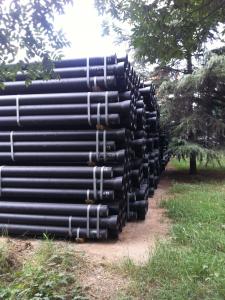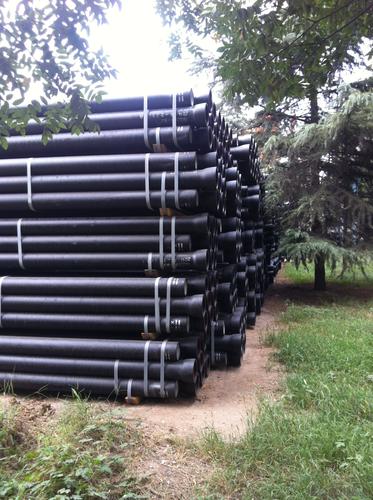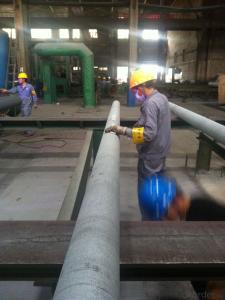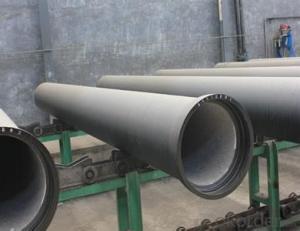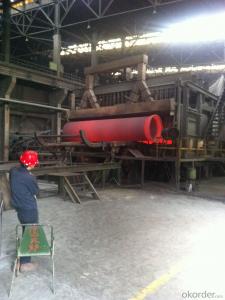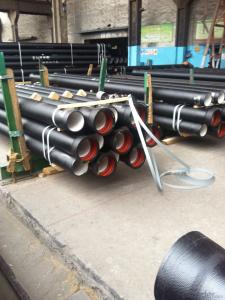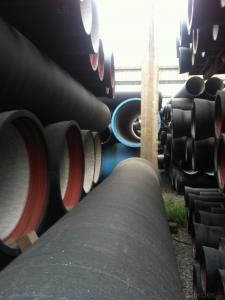DUCTILE IRON PIPE AND PIPE FITTINGS K7 CLASS DN100
- Loading Port:
- Tianjin
- Payment Terms:
- TT OR LC
- Min Order Qty:
- 23 pc
- Supply Capability:
- 3000 pc/month
OKorder Service Pledge
OKorder Financial Service
You Might Also Like
· Material : Ductile Cast Iron
· Size Range : DN 80mm to DN 2000mm
· Unit Effective Length : 6m or 5.7m
· Manufacture Standard: ISO 2531:1998/ EN 545:2006/EN 598:2007
· Annual capacity : 200,000 tons
· Coating Exterior: Zinc 130g/m2 according to ISO 8179-1 and bitumen coating 70 microns.
· Cement Interior: Portland Cement/ High Alumina Cement/ Sulphate Resisting Cement Lining according to ISO 4179
· Special requirements on external coating and internal lining can be applied
· We also provide accessories such as SBR/EPDM rubber gaskets, lubricant paste, pipe caps, PE sleeves, etc.
Additional Parts:
Each pipe is strictly inspected according to related standard to ensure permanently high performance.
Easy Installation at site and service free for life
Long Service Lifespan
Quotation will arrive you within 24hours once we get your inquiry.
We guarantee offering you a competitive price.
A copy of original inspection reports of pipes will be offered after shipment.
Photos of loading process will be sent to the customer after shipment effect.
We will follow-up the delivery progress after shipment effect and update to the customer on weekly basis.
- Q: Are ductile iron pipes suitable for high-temperature applications?
- High-temperature applications are generally not suitable for ductile iron pipes. Despite their strength and durability, ductile iron has limitations in high temperatures. Ductile iron pipes usually have a maximum operating temperature of around 250-300 degrees Fahrenheit (120-150 degrees Celsius). When subjected to higher temperatures, ductile iron pipes can undergo thermal expansion, potentially causing cracks or distortions. This can compromise the pipe's structural integrity, leading to leaks or failures. Additionally, ductile iron is vulnerable to oxidation at elevated temperatures, further deteriorating its performance over time. For high-temperature applications, it is generally advisable to opt for materials specifically designed for such conditions, like stainless steel or high-temperature alloys. These materials offer superior resistance against thermal expansion, oxidation, and other factors associated with high temperatures.
- Q: What are the common methods for cutting ductile iron pipes?
- Some common methods for cutting ductile iron pipes include using a handheld reciprocating saw with a metal-cutting blade, using a portable bandsaw, using a chop saw with a diamond-tipped blade, and using a pipe cutter specifically designed for ductile iron pipes. Additionally, some professionals may also use oxy-fuel or plasma cutting methods for larger diameter pipes.
- Q: Can ductile iron pipes be used in high-temperature applications?
- Yes, ductile iron pipes can be used in high-temperature applications. Ductile iron has excellent heat resistance properties, with a maximum recommended operating temperature of around 450 degrees Fahrenheit. This makes it suitable for a wide range of industrial and commercial applications where high temperatures are involved, including steam, hot water, and thermal oil systems.
- Q: Can ductile iron pipes be used for both water and wastewater applications?
- Yes, ductile iron pipes can be used for both water and wastewater applications. Ductile iron pipes are known for their durability, strength, and corrosion resistance, making them suitable for a wide range of applications including water distribution, sewage systems, and wastewater treatment plants. These pipes are designed to withstand high pressure and are capable of handling the flow of both water and wastewater. Additionally, ductile iron pipes have a long lifespan, reducing the need for frequent replacements and maintenance, which makes them a cost-effective choice for both water and wastewater applications.
- Q: What effect does magnesium play in nodular cast iron?
- Magnesium is played by spheroidizing.Nodular cast iron is added a certain amount of spheroidizing agent (magnesium or rare earth magnesium alloy) to the paste before casting, so that all or most of the carbon is spherical graphite and is distributed on the base.
- Q: What is the expected bedding and backfill requirements for ductile iron pipes?
- The expected bedding and backfill requirements for ductile iron pipes are vital for ensuring the longevity and proper functioning of the pipe system. Ductile iron pipes are known for their durability and strength, but they still require careful installation to prevent any potential damage or compromised performance. The bedding requirements for ductile iron pipes involve providing a stable and uniform support system to distribute the loads and stresses from the surrounding soil. The pipe should be surrounded by a bedding material that is free from rocks, debris, or any sharp objects that could potentially cause damage. The bedding material should also have sufficient compaction to prevent settlement or shifting that could lead to misalignment or pipe failure. Typically, the bedding material used for ductile iron pipes is a granular material, such as sand or fine aggregate, with a thickness of at least 6 inches. This material should be placed beneath and around the pipe in a uniform manner to provide a continuous support system. Additionally, the bedding material should be compacted to at least 90% of the maximum dry density to ensure proper stability and load distribution. Backfill requirements for ductile iron pipes involve the material used to fill the remaining space around the pipe after the bedding has been installed. The backfill material should also be free from rocks, debris, or sharp objects that could potentially damage the pipe. It should provide support and protection to the pipe while allowing for proper compaction and settling. The backfill material for ductile iron pipes is typically a granular material, such as sand or fine aggregate, with a maximum particle size of 1 inch. The backfill material should be placed and compacted in layers, ensuring that the compaction is done uniformly and evenly around the pipe. The compaction should be sufficient to prevent settlement or shifting of the backfill material, which could lead to pipe damage or misalignment. In summary, the expected bedding and backfill requirements for ductile iron pipes involve using a granular material that is free from rocks, debris, or sharp objects. The material should be placed and compacted in a uniform manner to provide stable support and protection to the pipe. Adhering to these requirements will help ensure the proper functioning and longevity of ductile iron pipe systems.
- Q: Can ductile iron pipe be used for industrial applications?
- Ductile iron pipe is well-suited for industrial applications due to its strength, durability, and flexibility. It is widely used in various industrial settings like power plants, chemical plants, refineries, and manufacturing plants for transporting water, wastewater, and other fluids. In these environments, where pipes may face exposure to chemicals, high temperatures, or abrasive materials, ductile iron pipe's resistance to corrosion is particularly important. Moreover, its high tensile strength enables it to endure high-pressure applications, making it an excellent choice for industrial use. Overall, ductile iron pipe proves to be a dependable and cost-effective option for a range of industrial applications.
- Q: What are the different corrosion protection options for ductile iron pipe?
- To ensure the longevity and durability of ductile iron pipes, there are several options available for corrosion protection. These options are as follows: 1. Cement Mortar Lining: A layer of cement mortar is applied to the inner surface of the pipe, creating a barrier against corrosive elements in water or soil. This lining offers excellent corrosion resistance and can endure for many decades. 2. Polyethylene Encasement: The ductile iron pipe is wrapped with a layer of polyethylene material, which acts as a physical shield against external corrosive elements. This method is commonly employed in aggressive soil conditions and provides long-lasting protection. 3. Internal and External Coatings: Different types of coatings, such as epoxy, polyurethane, or fusion-bonded epoxy (FBE) coatings, can be applied to the inner and outer surfaces of the pipe to resist corrosion. These coatings form a barrier that prevents the pipe from corroding in the surrounding environment. 4. Cathodic Protection: An electrical current is utilized to safeguard the pipe from corrosion. Cathodic protection systems can be either galvanic (sacrificial anode) or impressed current systems. These systems control the flow of electrons, preventing the oxidation of the ductile iron pipe. 5. Zinc Coating: Also known as galvanizing, this method involves applying a layer of zinc to the surface of the ductile iron pipe. Zinc acts as a sacrificial anode, corroding instead of the iron pipe. Zinc coating is particularly effective in soil conditions with low resistivity, offering reliable corrosion protection. It is crucial to consider various factors such as the environment, water chemistry, soil conditions, and expected service life when choosing a corrosion protection option for ductile iron pipes. Consulting with corrosion protection specialists and engineers can assist in selecting the most suitable option for specific applications.
- Q: What is the expected deflection limit of ductile iron pipes?
- The expected deflection limit of ductile iron pipes is typically around 2% of the pipe's diameter, as per industry standards.
- Q: Ductile iron pipe length is generally much
- The water-cooled metal ductile iron pipe has a single length of 6 meters, and the current mainstream ductile tubes are water-cooled metal ductile iron pipes.
Send your message to us
DUCTILE IRON PIPE AND PIPE FITTINGS K7 CLASS DN100
- Loading Port:
- Tianjin
- Payment Terms:
- TT OR LC
- Min Order Qty:
- 23 pc
- Supply Capability:
- 3000 pc/month
OKorder Service Pledge
OKorder Financial Service
Similar products
Hot products
Hot Searches
Related keywords
